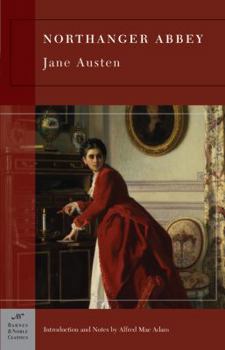Northanger Abbey
Select Format
Select Condition 
Book Overview
Austen's witty exploration of the perils of mistaking fiction for reality During an eventful season at Bath, young, na ve Catherine Morland experiences the joys of fashionable society for the first... This description may be from another edition of this product.
Format:Paperback
Language:English
ISBN:1593082649
ISBN13:9781593082642
Release Date:March 2005
Publisher:Barnes & Noble Classics
Length:260 Pages
Weight:0.58 lbs.
Dimensions:0.8" x 6.5" x 8.0"
Age Range:7 to 10 years
Grade Range:Grades 2 to 5
Customer Reviews
7 ratings
Not "Like New" caution!
Published by Crystal King , 6 months ago
Do not trust the condition! I got a hard cover that said like new and it had mold because something was spilled inside. Usually I don't mind the foxing, but I was expecting something cleaner. I am shocked they allowed this to be sent. It is "acceptable" at best.
Northanger Abbey Review
Published by Elizabeth , 8 months ago
Northanger Abbey is probably the shortest of Jane Austen's works. I read it quickly and really really liked it. I appreciated it more knowing the background as to why Jane Austen wrote it. It was written back when gothic novels were the thing, and Jane Austen wrote it to make fun of that style of prose. I found that extremely funny, and so rather enjoyed the book. I liked the book a lot more knowing and appreciating the history behind it. However, while I enjoyed it, not much happened. Catherine Morland reminds me of Harriet Smith from Emma. Naive and easily in love. I like the relationship between her and Tilney, UNTIL the end of the book when it is stated that the only reason Tilney even considered Catherine as a love interest was because he found out she was smitten with him. I really feel that this downgrades their relationship, and makes both their relationship and the character of Tilney shallow. Overall, I liked it; it is a quick read and rather funny if you know the history behind it, but Tilney and Catherine are definitely not Jane Austen's greatest couple. Northanger Abbey is different from Jane's other novels because, I think, she was changing her writing style to try to make a statement, showing the silliness of gothic novels.
Wrong edition
Published by Faustina W , 1 year ago
It said in the description that this was the penguin classics edition and that’s not what I got. It was the signet classics. So just be aware of that
Not to be confused with a different B & N edition, this edition is sturdy and has added features.
Published by Thriftbooks.com User , 16 years ago
Frankly I am puzzled by the criticisms leveled at this edition. There is another edition [also by Barnes and Noble] and it is cheaper, though the quality is very flimsy and I wonder if the other reviewers were confused with that edition? This edition of Northanger Abbey is beautifully bound, with a cloth spine, and has a lovely portrait on the cover. The text is not too small unlike some other editions, it makes for comfortable reading. The book itself is sturdy, as it is in hardback, but not unwieldy - it fits nicely into my hands. Besides the main text of Austen's novel itself, it has added features - a brief chronology of the world of Jane Austen & Northanger Abbey, an introduction, the main text, as well as useful endnotes, inspiration for Northanger Abbey,comments, as well as a list of resources for further reading and criticisms. In all, a value buy.
Absolutely delightful
Published by Thriftbooks.com User , 19 years ago
I approached this book somewhat warily, knowing that Northanger Abbey was to some degree a satirical take on the immense popularity of Gothic romances such as Ann Radcliffe's The Mysteries of Udolpho, a book I dearly love. Happily, Austen's means of poking fun at Gothic horror literature are far from mean-spirited and, as a matter of fact, can be delightfully humorous indeed. Her heroine, Catherine Morland, is by no means the type of heroine to be found in the giant tomes of Radcliffe and her indulgent imitators, as Austen tells her reading audience directly from the very start. "Almost attractive" on a good day, this unintellectual tomboy has reached her fifteenth year without inspiring a young man's fancy, nor would she be able to delight him with musical skill or even draw his profile in her secret notebooks if she had. Having encountered no strangers who would prove to be a lord or prince in disguise, her heroic ambitions seem stymied at best until fate steps in and grants her a stay of several weeks in the delightful town of Bath. Making her transition from naïve girl to equally naïve young lady, Catherine almost immediately falls quite in love with young Henry Tilney, while at the same time she becomes intimate friends with an older young lady named Isabella, whose inconstancy as both friend and intended beloved of Catherine's own brother eventually brings her much pain. To her intense delight, however, Catherine is invited by General Tilney, Henry's father, to spend some few weeks in his home, Northanger Abbey. Her joy at spending such private time in the company of her beloved and new best friend Eleanor Tilney is immense, but equally exciting to her is the chance to spend time in a mysterious former abbey of the sort she has read so much about. Such Gothic romances as Udolpho have been the source of her recent heroic training, and she is wildly desirous and fully expectant of discovering hidden passages, dark secrets, frightening circumstances, and possibly even incalcitrant perfidy in the halls of her beloved's family home. Her overactive imagination runs wild in Northanger Abbey, bringing her a fair share of embarrassment, but the very sweet and tender sensibilities that fuel her fire for Gothic mystery make her all the more endearing to me. Catherine is remarkably innocent, and as such she is absolutely delightful in my eyes. Much of the story does fit in with your typical Gothic novel, but the frightening and dismaying things Catherine eventually discovers are of a far from supernatural sort. Ever so gradually, a true monster slowly coalesces from the pages of this remarkable novel. I, like young Catherine, was somewhat overenthusiastic concerning the Gothic qualities of this adventure I feel I shared with her, and the truly despicable thoughts and actions of the book's villain did not immediately strike me as forcefully as they should have; the afterword by Elizabeth Hardwick included in my Signet Classic copy of the book, however,
Absolutely delightful
Published by Thriftbooks.com User , 21 years ago
I approached this book somewhat warily, knowing that Northanger Abbey was to some degree a satirical take on the immense popularity of Gothic romances such as Ann Radcliffe's The Mysteries of Udolpho, a book I dearly love. Happily, Austen's means of poking fun at Gothic horror literature are far from mean-spirited and, as a matter of fact, can be delightfully humorous indeed. Her heroine, Catherine Morland, is by no means the type of heroine to be found in the giant tomes of Radcliffe and her indulgent imitators, as Austen tells her reading audience directly from the very start. "Almost attractive" on a good day, this unintellectual tomboy has reached her fifteenth year without inspiring a young man's fancy, nor would she be able to delight him with musical skill or even draw his profile in her secret notebooks if she had. Having encountered no strangers who would prove to be a lord or prince in disguise, her heroic ambitions seem stymied at best until fate steps in and grants her a stay of several weeks in the delightful town of Bath. Making her transition from naïve girl to equally naïve young lady, Catherine almost immediately falls quite in love with young Henry Tilney, while at the same time she becomes intimate friends with an older young lady named Isabella, whose inconstancy as both friend and intended beloved of Catherine's own brother eventually brings her much pain. To her intense delight, however, Catherine is invited by General Tilney, Henry's father, to spend some few weeks in his home, Northanger Abbey. Her joy at spending such private time in the company of her beloved and new best friend Eleanor Tilney is immense, but equally exciting to her is the chance to spend time in a mysterious former abbey of the sort she has read so much about. Such Gothic romances as Udolpho have been the source of her recent heroic training, and she is wildly desirous and fully expectant of discovering hidden passages, dark secrets, frightening circumstances, and possibly even incalcitrant perfidy in the halls of her beloved's family home. Her overactive imagination runs wild in Northanger Abbey, bringing her a fair share of embarrassment, but the very sweet and tender sensibilities that fuel her fire for Gothic mystery make her all the more endearing to me. Catherine is remarkably innocent, and as such she is absolutely delightful in my eyes.Much of the story does fit in with your typical Gothic novel, but the frightening and dismaying things Catherine eventually discovers are of a far from supernatural sort. Ever so gradually, a true monster slowly coalesces from the pages of this remarkable novel. I, like young Catherine, was somewhat overenthusiastic concerning the Gothic qualities of this adventure I feel I shared with her, and the truly despicable thoughts and actions of the book's villain did not immediately strike me as forcefully as they should have; the afterword by Elizabeth Hardwick included in my Signet Classic copy of the book
A hilarious sendup of the Gothic novel
Published by Thriftbooks.com User , 25 years ago
I used to love Gothic novels. I collected out-of-print Victoria Holt paperbacks, I had stuffed animals named after characters in Charlotte and Emily Bronte novels, but ever since I've read Northanger Abbey, I can't read a Gothic novel with a straight face. Jane Austen does a marvelous job of sending up convoluted scary novels (and melodrama in general) in this book, and creates her most masculine and fascinating hero, Henry Tilney.Don't think that Catherine Morland, the heroine, is just a naive kid. Her naivete is a necessary component of the novel, as it allows her to see the wider world with fresh eyes, provide a foil to the more worldly characters, and ultimately capture the heart of the hero. And then there's Henry...he teases, he teaches, he forgives Catherine's regrettable fancies, knowing that he had a hand in encouraging them. He's witty, he's charming, he's kind of a slob, and he wears his greatcoats so well!As in all her novels, Jane Austen provides a great host of hilarious supporting characters, in particular John and Isabella Thorpe and Mrs. Allen. I defy anyone not to laugh at John Thorpe's nonsensical and contradictory comments. One wonders how many such "rattles" wearied Miss Austen's attention to provide such a character study.Great writing, great story, great characters...come to Northanger Abbey with a sense of humor and you will not be disappointed.
Northanger Abbey Mentions in Our Blog

15 Marvelous Book-to-Screen Adaptations from Masterpiece
Published by Ashly Moore Sheldon • May 25, 2021
And in the category of our favorite things: Book-to-screen adaptations! For over fifty years now, Masterpiece (Formerly Masterpiece Theatre) has been bringing fantastic novels to the small screen in the form of series, miniseries, and movies.







